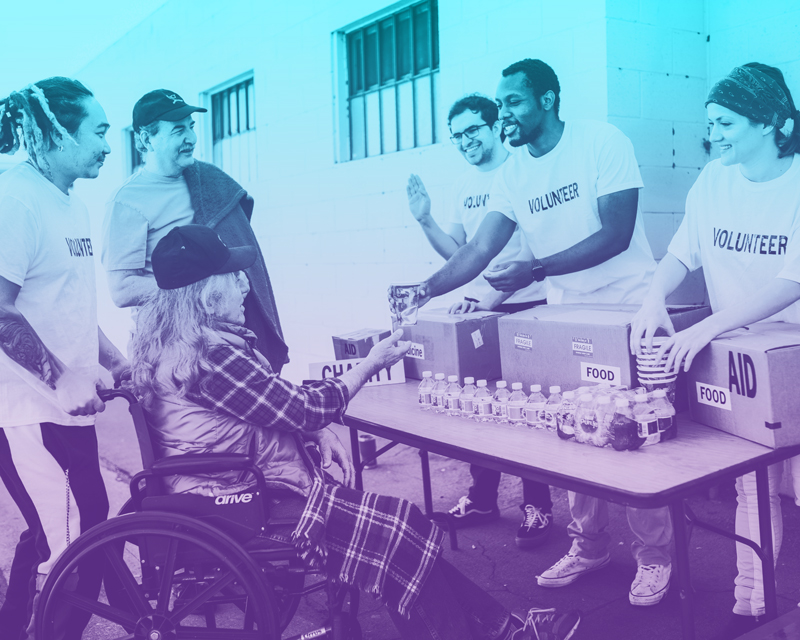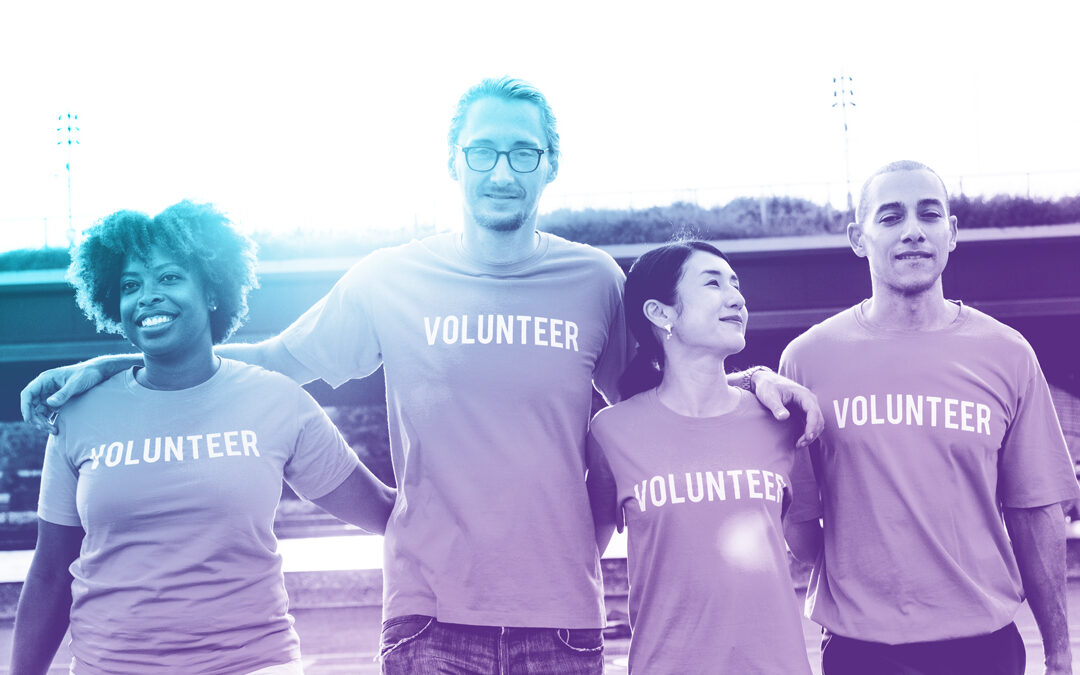Volunteering During & After Recovery
Recovery is a lifelong process. No matter how long you’ve been sober, your habits and lifestyle are an imperative part of this journey. Filling your life with enriching habits can help you maintain your commitment to recovery, and neglecting your own wellbeing can make it difficult to stick with sobriety. Perhaps this is why volunteering is such as popular activity for people who are in recovery. The benefits are clear — volunteering can help you develop new skills, enjoy better health, and develop a sense of purpose.

The latter of these is perhaps the most important. People relapse for a wide variety of reasons, but one of the most common triggers is a lack of purpose and motivation. Volunteering is a great way to find that sense of purpose and avoid relapse. There are many other benefits it can bring to your recovery journey, too.
What Causes a Relapse?
According to the National Institute on Drug Abuse, anywhere from 40 to 60% of people in recovery will relapse at some point. In this context, relapse is defined as the unwanted recurrence of behaviors associated with substance abuse. Though relapse isn’t ideal, it is a normal part of recovery, and there are several types of triggers that it can commonly be attributed to.
Triggering Circumstances
One of the most common causes of relapse is encountering circumstances that are somehow connected to your previous habits of addiction. Perhaps this is because these circumstances violate the first rule of recovery that’s recommended by addiction experts — change your life. In order to truly change your life, you need to avoid all of the people, places, and things that were previously associated with your substance abuse. Encountering these circumstances again can quickly provide undue temptation that increases your likelihood of relapsing.
Stress and Emotional Challenges
Another common cause of relapse is the presence of stress or emotional challenges in a person’s life. Research indicates that stressful situations tend to increase cravings for drugs or alcohol, so it makes sense that the likelihood of a relapse would increase, too. This correlation is likely due to the need for a coping mechanism. If you are struggling with the turmoil caused by an emotional upset, you need a solution to distract you or dull the discomfort. Drugs and alcohol are often a readily available option, but of course, relapse will only worsen the stress you may feel.
Proximity to Substance
Finally, sometimes relapse is simply a matter of proximity. When a person finds that they are near drugs or alcohol, it’s unsurprising that they are far more likely to relapse and partake in these substances. This is why it’s vitally important to follow rule one of recovery and change your life by removing all people, places, and things that may make your substance of choice more available. Recovery is most successful when the temptation of easy availability can be eliminated from your life.
Volunteering Counteracts Common Causes of Relapse
The most common causes of relapse are clear — but what is the solution? How can you “change your life” as the experts recommend? Volunteering is one of the best ways to mitigate potential opportunities for relapse while developing new habits to replace your old ones.
No Circumstantial Triggers
One of the biggest benefits of volunteering — as it relates to recovery — is the lack of circumstantial triggers that are often found in a volunteer work setting. Unfortunately, the people, places, and things that you associate with substance abuse can emerge practically anywhere, without notice — and jeopardize your recovery in the process. This is especially true if you’ve participated in a treatment program and struggle to fill your time upon release. How can you avoid these triggers and ensure that you spend your time away from anything that may encourage a relapse? Volunteering is a great way to do so because it typically takes place in a positive environment that’s focused on providing service and positive social interactions.
Stress Relief and Emotional Regulation
Did you know that volunteering can also help you relieve stress and regulate your emotions? Indeed, these are two of the most common triggers for relapse. And volunteering can help to mitigate them both. This is because volunteering offers an opportunity to see outside ourselves and empathize with others. While it’s easy to dwell on negative emotions and stressful situations in solitude, it’s more difficult to do when you’re interacting with other people in a positive, uplifting environment. Volunteering is also proven to relieve stress due to the release of dopamine that occurs during volunteer work. Both of these effects can ultimately contribute to a sense of purpose that further supports your journey towards recovery.
Distance From Any Substances
If proximity to drugs or alcohol may be a trigger for relapse, spending your time volunteering is a great way to create distance. Many volunteer opportunities will be found in a place that’s managed by a nonprofit organization, and these settings should be a safe place that’s void of any substance-related temptations. If you aim to change your life in order to recover, volunteering offers the opportunity to spend time in a positive environment, away from many of the triggers that may put you at an increased risk of relapse.
Other Benefits of Volunteering
Volunteering doesn’t just benefit you and your recovery. It also benefits your community and the people who surround you. If you want to make a difference, work on yourself, and make progress in your recovery all at the same time, volunteering is a great way to do so — and the following benefits certainly make it worthwhile.
Help Others Improve Their Lives
Of course you want to improve your own life, but it can be even more rewarding to help others improve their lives, too. Neurological research has shown that generosity — including the generosity of volunteering — can trigger activity in the mesolimbic region of the brain in the same way that a monetary reward might. This is particularly interesting, given the relationship between addiction and the mesolimbic pathway. Though research has not established a cause-and-effect relationship, this data indicates that volunteering may be directly beneficial to the part of the brain that’s susceptible to activity that triggers substance abuse.
Discover New Passions and Talents
Helping others is a great way to spend your time, but perhaps you want to find volunteer opportunities that allow you to invest in yourself, too. You can do this by pursuing programs that focus on activities and interests that you are passionate about. Early in recovery, many people struggle to redefine themselves and develop a new identity as a sober person. Volunteering can greatly aid in this process, though — especially if you volunteer in areas that allow you to hone in on your own talents and skills.
Build Connections in Your Community
Just as you may struggle to develop a new identity in recovery, you may also struggle to forge a new friend group. For many people, the friends that they had pre-recovery played a part in enabling their substance abuse. This can be a difficult realization, but it’s necessary if you want to remain committed to sobriety. Volunteering offers a chance to make new connections with people and develop a new friend group who will support and encourage your journey in recovery.
Find Out How to Start Your Recovery Journey
Starting recovery isn’t easy. Whether you deal with drug or alcohol substance abuse issues, it takes courage and commitment to finally reach out for help. When you do, though, you’ll find that there is a life of freedom waiting on the other side. Clean Recovery Centers is committed to helping people discover that freedom and implement strategies — such as volunteering — that will further reduce the likelihood of relapse. If you want to learn more about our treatment programs, call us at (813) 548-5154 or reach out to us online.
Sources:
- https://www.forbes.com/sites/nextavenue/2015/03/19/5-surprising-benefits-of-volunteering/?sh=516c76a3127b
- https://www.drugabuse.gov/publications/drugs-brains-behavior-science-addiction/treatment-recovery
- https://www.ncbi.nlm.nih.gov/pmc/articles/PMC4553654/
- https://link.springer.com/article/10.1007/s11920-011-0224-0
- https://www.researchgate.net/publication/240174441_The_relations_of_emotionality_and_regulation_to_dispositional_empathy-related_responding_among_volunteers-in-training
- https://www.mayoclinichealthsystem.org/hometown-health/speaking-of-health/3-health-benefits-of-volunteering#:~:text=Volunteering%20reduces%20stress%20and%20increases,have%20a%20stress%2Dreducing%20effect.
- https://www.psychologytoday.com/us/blog/between-cultures/201805/in-helping-others-you-help-yourself
- https://www.sciencedirect.com/topics/medicine-and-dentistry/mesolimbic-dopaminergic-system#:~:text=The%20mesolimbic%20dopaminergic%20system%20is%20thought%20to%20be%20involved%20in,effects%20of%20drugs%20of%20abuse.&text=CART%20peptide%20also%20modulates%20the,important%20role%20in%20drug%20addiction.


